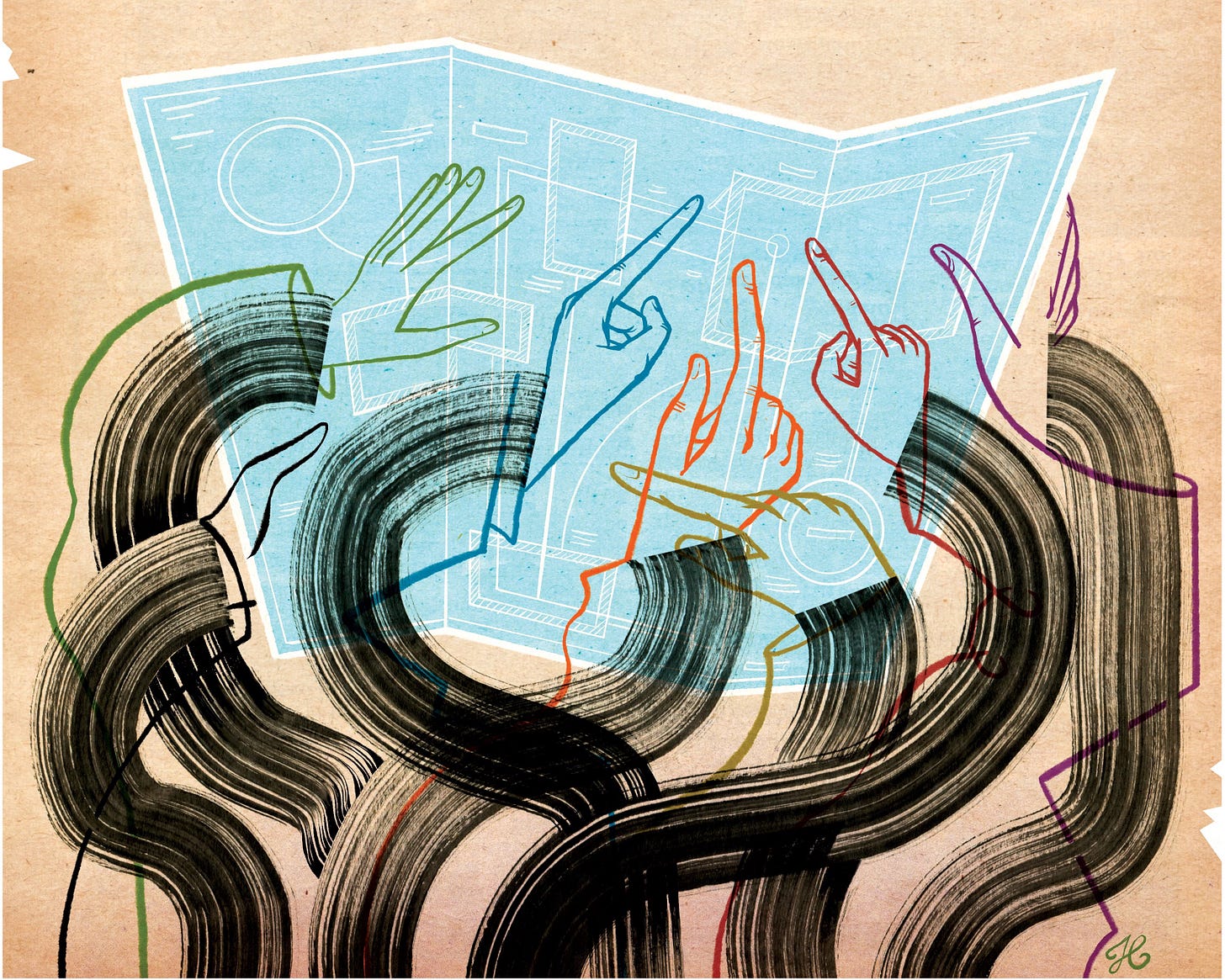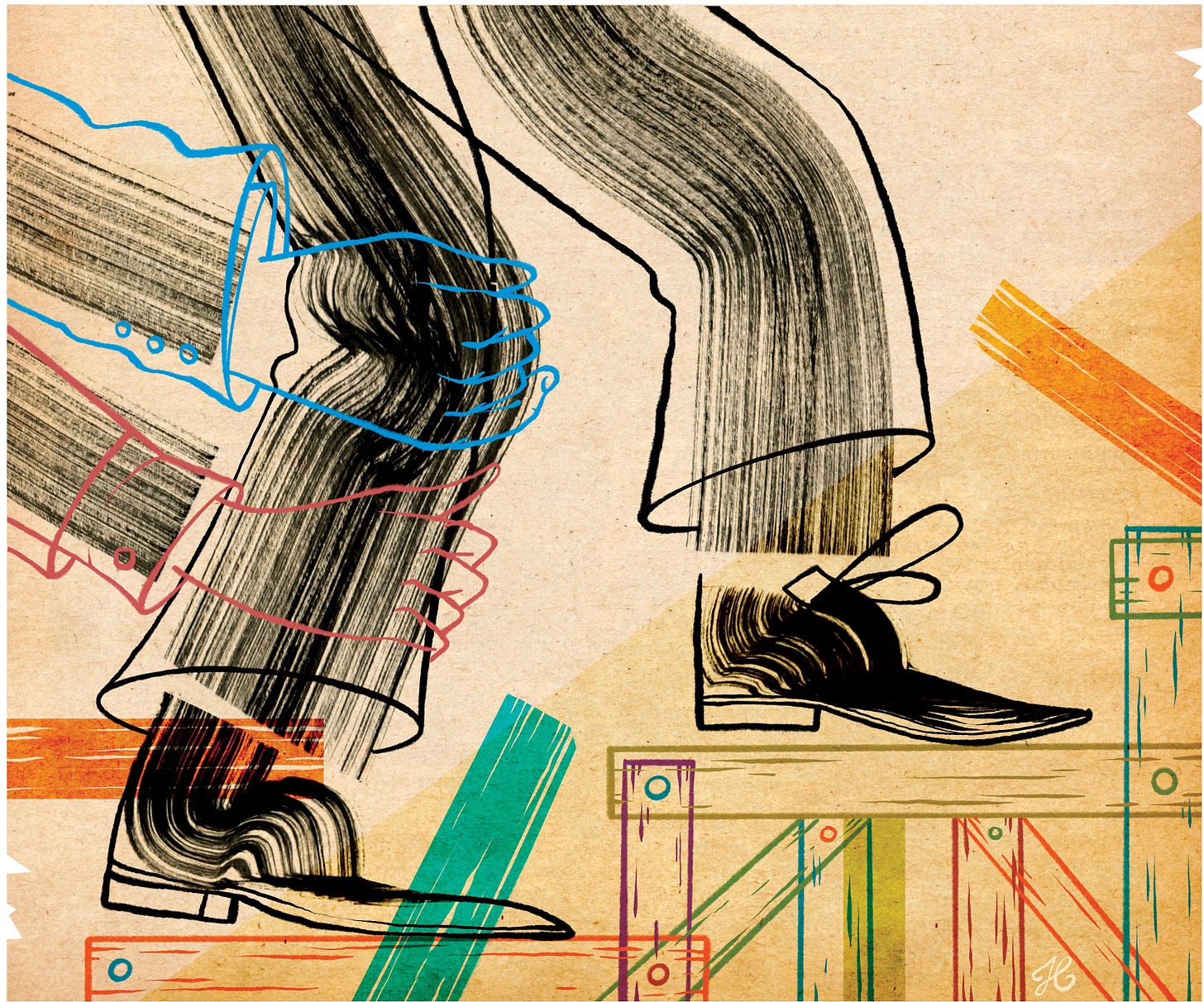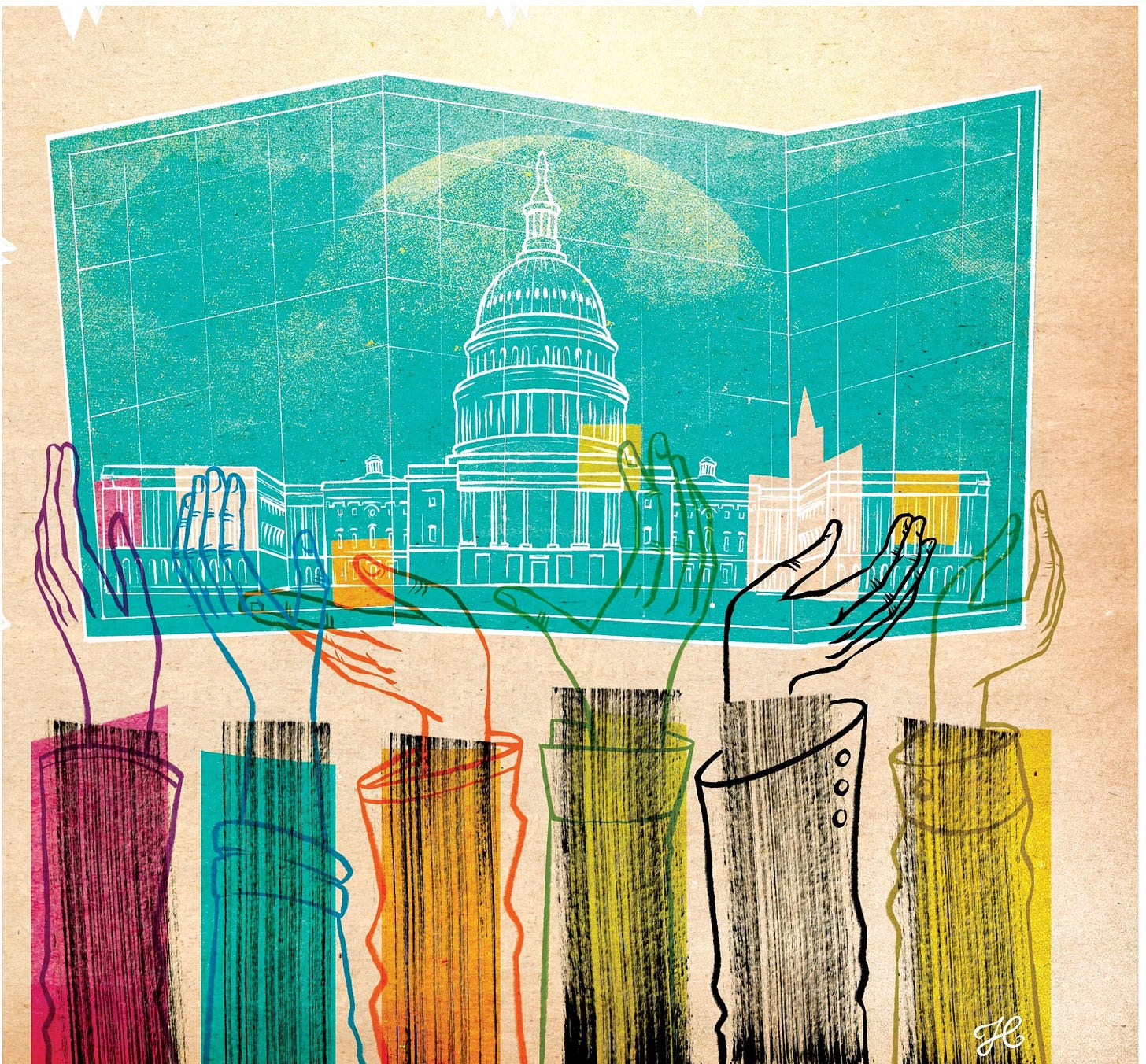Latter-day Saints Can Save America
In November 2021, an elderly man, thin and with a dignified demeanor leavened by an impish smile, traveled from Salt Lake City to the University of Virginia with an urgent message. Wasting little time on pleasantries, he launched straight into his theme. “I love this country, which I believe was established with the blessings of God. I love its Constitution, whose principles I believe were divinely inspired. I am, therefore, distressed at the way we are handling the national issues that divide us.”
In expressing his distress, he was not speaking merely for himself. This was Dallin Oaks, first counselor in the First Presidency of the Church of Jesus Christ of Latter-day Saints. Then almost 90, he had been a successful lawyer, a justice of the Utah state supreme court, and president of Brigham Young University. Called to the First Presidency in 2018, he was next in line to succeed Russell M. Nelson, the church’s president and prophet; and he had become the public voice of the church’s civic theology.
A civic theology posits that God expects his people to act in certain ways, and to follow his commandments, not only in our personal lives but in our civic lives. In that respect, it operates in the same space as Christian nationalism—though what Oaks proposed was antithetical to Christian nationalism and far more profound and promising. When I first read the text of his speech, I felt a frisson. Here was something I had been looking for in my own advocacy of religious liberty and liberal pluralism because it elegantly linked the two.
Oaks’s brief began where James Madison and the U.S. Constitution also begin: with the inescapable reality of disagreement and faction. “We have always had to work through serious political conflicts,” Oaks said, “but today too many approach that task as if their preferred outcome must entirely prevail over all others, even in our pluralistic society. We need to work for a better way—a way to resolve differences without compromising core values.”
Liberalism is a permanent state of public negotiation. Oaks argued that religious communities cannot exempt themselves from democratic deliberation; they must participate in it and abide by the results according to “the principle of honoring both divine and mortal laws.” In other words, religious liberty is essential, but people of faith cannot simply enjoy it and walk away. It comes with obligations. “Rendering to Caesar in good faith,” said Oaks, “requires religious persons and associations to acknowledge what their government does for them and to be faithful in fulfilling the reciprocal responsibilities they owe to the government and their fellow citizens.”
But what are those responsibilities, and how are they to be carried out on occasions when God’s law and man’s law might conflict? Oaks’s example was a clash between antidiscrimination laws requiring merchants and adoption agencies to serve same-sex weddings and couples, on the one hand, and, on the other hand, religious businesses and nonprofits whose faith commitments forbid participation in what they see as sin. Some Christians and their legal allies are quick to strike a confrontational posture when a conflict arises—or even when a conflict does not arise, as when, not long ago, a website designer sued successfully to refuse service to same-sex weddings despite not having been asked to serve one. Oaks took a different tack. “The Church of Jesus Christ of Latter-day Saints suggests that a way can be found to reconcile divine and human law—through patience, negotiation, and mutual accommodation, without judicial fiat or other official coercion.”
In other words, the first order of the day is not to claim supremacy for either religious or secular law, or to declare an existential clash, but to look—together—for ways to mitigate conflict. “The right relationship between religious freedom and nondiscrimination,” he said, “is best achieved by respecting each other enough to negotiate in good faith and by caring for each other enough that the freedom and protection we seek is not for ourselves alone.” Like Madison, he placed good-faith negotiation at the very center of the Constitution’s meaning, quoting another church official who said, “When we use our religious freedom to bring people together in unity and love, we are defending and preserving religious liberty and the Constitution in a most profound way.”
Significantly, Oaks argued that seeking unity through patience, negotiation, and mutual accommodation is not merely a stratagem for getting along with others; it is a charge from God. In remarks to the faithful earlier that year at the church’s general conference, he said, “Being subject to presidents or rulers of course poses no obstacle to our opposing individual laws or policies. It does require that we exercise our influence civilly and peacefully within the framework of our constitutions and applicable laws. On contested issues, we should seek to moderate and unify.”
In Church of Jesus Christ of Latter-day Saints scripture, the U.S. Constitution is specifically named as divinely inspired; and in church doctrine, the Constitution’s underlying principles were decreed by God not only for Americans but for all God’s children. “I see divine inspiration in the vital purpose of the entire Constitution,” Oaks told the general conference. “We are to be governed by law and not by individuals, and our loyalty is to the Constitution and its principles and processes, not to any office holder. In this way, all persons are to be equal before the law.” (Italics are in the original.)
This doctrine places the church under certain obligations. In a speech in Rome in 2022, Oaks said, “Speaking from a religious perspective, I maintain that followers of Jesus Christ have a duty to seek harmony and peace.” This duty pertains not just to seeking harmony and peace in one’s own church and family and local community; it is a civic commandment, a requirement to approach politics and public debate in a particular way. As Oaks wrote in an article in the scholarly journal Judicature in 2023, “We should not expect or seek total dominance for our own positions.”
Here the italics are mine, because this is more than a tactical injunction to obey the law in order to stay out of jail, and more than “render unto Caesar” boilerplate. Oaks argues for an alignment between God’s moral constitution and Madison’s political one. Speaking for the church, he sees patience, negotiation, and compromise not as means to some end, to be jettisoned if the results are unsatisfying, but as social and spiritual ends unto themselves. At the risk of exaggerating or oversimplifying (but only a little), one could put what he is saying this way: Never dominate, always negotiate—because that is God’s plan.
Neither secular liberalism nor religion can independently deliver all the moral goods people require; but American liberalism and American Christianity are pulling apart. The result is a crisis for both Christianity and democracy.
I find reason for hope. Influential religious figures have discovered the hole where a biblically based, pro-democratic civic theology should be and are striving to fill it. Some of them are evangelicals, others not; most are Christian, but one could take inspiration from a rabbi I know who has integrated core American texts into his congregation’s Torah study (a concept he and his synagogue are bringing to other congregations). But for today’s most intellectually complete and pragmatically proven vision of a distinctively scriptural pluralism, we should travel to Utah.
Countercultural Compromises
My awareness of something interesting afoot in the Church of Jesus Christ of Latter-day Saints came in March 2015, with the announcement of what seemed like a miracle in Utah. Seemingly out of nowhere, at a press conference in Salt Lake City, conservative state legislators, leaders of the state’s LGBT rights community, and senior representatives of the church announced agreement on legislation extending nondiscrimination protections to LGBT Utahns while also providing targeted exemptions for religious organizations. The bill, SB 296, passed the conservative legislature with overwhelming support.
Madison put compromise at the heart of the Constitution because he correctly understood compromise to be more than a mechanical, difference-splitting approach to managing conflict. While it can sometimes be mere difference-splitting, compromise is more often a creative, generative, pro-social endeavor in its own right. If the parties in a disagreement dead-lock, they gather more information, bring in new factions and voices, imagine innovations and workarounds. The result is often better than what anyone started with. And the legislative outcome is not the only product; just as important are the relationships built during negotiations, the habits of collaboration formed, and the feelings of goodwill and fellowship which arise among previously antagonistic groups. Simply by having to interact and do business, the parties to a negotiation develop the civic habits of peaceful coexistence and unlearn the habits of domination and distrust.
That happened in Utah. “To me the process here may be even more important than the legislation,” Troy Williams, the executive director of Equality Utah, the state’s main LGBT group, told me. “When I sit down with folks, I’ll never see them as an enemy or opponent. I’ll see them as future ally, even if we’re not there yet.” When I asked him to name the downsides of SB 296 from the point of view of Utah’s LGBT community, he couldn’t think of a single one. “The culture has changed here in Utah,” he said. “In every possible way, Utah is now a safer and more welcoming state for the LGBTQ community.” When I asked if the same change would have happened without SB 296, he replied with a firm no. “It changed the dynamic forever in the legislature. I’ve watched so many legislators open up their hearts in this process.”
The compromise of 2015 did not come out of nowhere. In 2008, the church had gone all-in to back California’s Proposition 8, which added a ban on same-sex marriage to the state’s constitution (ending a brief period in which same-sex marriage had been legalized by the state’s supreme court). The church called upon its members in California to contribute and canvass in support of the initiative; it even had local leaders read a statement over every Latter-day Saint pulpit in California, asking members to “do all you can to support the proposed constitutional amendment by donating of your means and time to assure that marriage in California is legally defined as being between a man and a woman.” Although Proposition 8 won at the ballot box, the church’s heavy-handed involvement—which may have been decisive—caused an uproar whose fury shocked and chastened the church’s leadership. Quietly, the church opened lines of communication with the LGBT community in Utah. Eyebrows went up in 2009 when the church threw its support behind Salt Lake City’s ban on anti-gay discrimination in housing and employment. That led to several years of quiet, intense conversations between the church and the LGBT community, initially aimed at listening and learning, then turning more substantive. SB 296 was only the visible tip of a larger, mostly submerged negotiation.
I was (and still am) a devoted advocate of both LGBT equality, especially marriage, and religious liberty. I believed there was room and need to negotiate pathways around conflicts. For me, SB 296 was inspirational.
So why was the Church of Jesus Christ of Latter-day Saints defending my legal right to marry a man and, beyond that, endorsing compromise as a good in and of itself? When I asked Dallin Oaks, he acknowledged tactical considerations. “We’re doctrinally against it,” he told me, meaning same-sex marriage, “but we believe in living under the Constitution and laws of the United States. So we don’t think we give up very much by having Congress enact something that’s already the law under the Supreme Court, and what we gain in the Respect for Marriage Act as amended is important enough. What we lose by codifying something that already exists is insignificant.” Okay, fair enough. But there had to be more to it than shrewd maneuvering. The church could have sat on the sidelines, saying and doing nothing to help the bill pass, or it could have joined with many other conservative religious groups in demanding protections for religious liberty without protection for marriage equality—a purist posture which would have been cost-free. Yet here was the Church of Jesus Christ of Latter-day Saints actively supporting a compromise contravening a core doctrine, when doing so was not cost-free.
Oaks, when we spoke about it, was well aware that the church’s conciliatory approach is conspicuously countercultural in the conservative religious world. The search for a way in the middle “means we’ve left some evangelicals behind and we don’t have the Catholic support that we usually have, and our position does not track well with conservative Republicans. So there are quite a few points of strain on that.” He professed not to care about other churches’ reactions (“I’m only concerned about what I said being right”), and he seemed quite cheerful about coloring outside the lines. He told me,
I have a professional lifetime interest in the Constitution of the United States, and how it could never have been adopted without compromise among groups that feel differently on powerful issues but found a way to realize that if they would give up on things that were less important they could achieve a common goal that’s most important of all. I think that’s an approach that has become less and less feasible during my lifetime. A different approach seems to be dominant in government and much public thinking, including among many religious people of different denominations. As I’ve prayerfully pondered and tried to see what God would have us do and what is good for our nation, I came to the position that I expressed in the lecture in Virginia.
Why might God require the Church of Jesus Christ of Latter-day Saints to take an approach which is, by the standards of conservative Christianity, distinctly countercultural, not to mention unpopular and, in the view of many, unbiblical? The answer goes deep.
A Thick and Strong Church
Before approaching that answer, I need to make five prefatory points. [F]irst, I am by no means a fan of all elements of the church and its theology. I find its teachings about homosexuality, in particular, repugnant and harmful, and its teachings about gender roles discriminatory and archaic. But the depth of our differences is precisely what makes the church’s ideas about pluralism so compelling.
The second point is that the Church of Jesus Christ of Latter-day Saints takes conservative views on social issues which resemble those of conservative evangelicals. Moreover, in the United States the two traditions have similar demographic profiles: largely white and disproportionately Republican. Those similarities make it all the more significant that the Church of Jesus Christ of Latter-day Saints has consciously chosen to reject the Church of Fear. Demographics and ideology, it turns out, do not dictate theology. We learn from the Church of Jesus Christ of Latter-day Saints that Christians can choose their civic posture. They are not merely buffeted hither and yon by outside cultural winds and secular pressures. They are not necessarily forced into an oppositional, confrontational stance by their conservative views.
A third observation: the Church of Jesus Christ of Latter-day Saints is not a “thin” religion. It has not blended into the cultural zeitgeist or watered down its requirements. Just the opposite; it is one of America’s most prominent examples of a thick faith, one which is both demanding and enfolding, combining high personal investment with high communal returns. “Let us here observe,” said Joseph Smith, the church’s founder, “that a religion that does not require the sacrifice of all things never has power sufficient to produce the faith necessary unto life and salvation.”
Which leads me to a fourth observation: the church is healthy. Vibrant, in fact. Worldwide, it is growing. In the United States, its growth seems to have leveled off after a period of robust expansion. Accurate counts are hard to come by because not all those listed as members on church rolls are active, but in a 2019 study the church demographer Stephen Cranney estimated the rate of attrition in the United States to be more or less offset by the rate of conversion. This makes a distinct contrast with the shrinkage of the mainline and evangelical denominations.
Finally, despite its misstep in 2008, the church has made a conscious choice not to dabble in partisan politics. It specifically forbids political preaching. The church leadership has rejected pleas, from inside and outside, to involve itself in issues like immigration and the environment. Some members, I was told, itch to see the church wade into the culture wars; but church officials I spoke with, including not only higher-ups in Salt Lake City but also ordinary bishops (i.e., local lay pastors), said that if a bishop or other ecclesiastical authority ventured into partisan politics, he would be promptly counseled and corrected. Sunday school and Seminary instruction, which I observed, stick to exposition of the church’s four sacred texts, taught on the same weekly schedule around the world, so that a student could move from Manassas to Manila without missing a verse. In the worship services and educational sessions I observed, I saw no hint of politics, even by implication.
Taking those observations together, we may pause to note something meaningful. The Church of Jesus Christ of Latter-day Saints achieved all of what I just mentioned without secularizing; without blending into the surrounding culture; without relinquishing its exacting requirements; and without yielding to demands that it embrace partisan politics and preach the culture wars. True, it has adapted in a variety of ways: obvious examples include banning polygamy and accepting African Americans into the priesthood. (Hope springs eternal for revelations about homosexuality and women.) But no one who even dips a toe in its waters thinks the church has lost its cultural distinctiveness or its theological moorings.
All of this, taken together, poses quite a problem for “post-liberal” critics of the classical liberal tradition. According to them, it should not be possible for a traditionalist, conservative church to embrace negotiation and mutual accommodation amid today’s consumeristic, individualistic, homogenizing culture while also preserving its values and its distinctiveness. If the post-liberal critique were true, the Church of Jesus Christ of Latter-day Saints should have been assimilated long ago by the relentlessly liberal Borg. Its members should be clamoring for a low-maintenance, unchallenging experience, and its leaders should be yielding to the pressures of social media and the sexual revolution. Resistance is futile, right?
In fact, the church helps us understand why aligning with liberal pluralism is not part of the problem for American Christianity; it is part of the solution.
Latter-day Saints’ attitudes toward pluralism, law, and religious freedom date back to the founding of the church.
Joseph Smith’s commitment to religious pluralism no doubt stemmed in part from the persecution he and his followers experienced; yet his writings on the subject transcend their historical moment, evincing a conviction which seems spiritual and even visionary. In the eleventh of his thirteen articles of faith, he says, “We claim the privilege of worshiping Almighty God according to the dictates of our own conscience, and allow all men the same privilege, let them worship how, where, or what they may.” And in 1843 he said:
The Saints can testify whether I am willing to lay down my life for my brethren. If it has been demonstrated that I have been willing to die for a “Mormon,” I am bold to declare before Heaven that I am just as ready to die in defending the rights of a Presbyterian, a Baptist, or a good man of any other denomination; for the same principle which would trample upon the rights of the Latter-day Saints would trample upon the rights of the Roman Catholics, or of any other denomination who may be unpopular and too weak to defend themselves.
In the modern church, to paraphrase Faulkner, the past is not dead; it’s not even the past. When I visited Salt Lake City for interviews with church officials and members, I was ambushed by an unexpected sense of recognition and kinship. As a Jew, I grew up immersed in a narrative of persecution, flight, exile, vulnerability, and vigilance. The Latter-day Saints have their own story of flight and exile: according to Smith’s revelation, the church’s earthly Zion is Jackson County, Missouri, not Salt Lake City. Like the Jews, the Latter-day Saints were driven out of their promised land and their plan for a great temple there is today unfulfilled. I feel an immense pride in America’s pluralism and tolerance while remaining conscious—as a Jew and also as a homosexual—of my status as a minority and an outsider. I experience the United States as my own country; yet more (I suspect) than my white Protestant friends, I feel that my sense of belonging to America does not translate into a sense that America belongs to me. I understand exactly what a Latter-day Saint who works in a church education program meant when he said, matter-of-factly, “We get persecuted, but so what?” Religious bigotry remains a fact of life for his church and perhaps always will, but he refuses to be defined by it. (That’s how I feel about antisemitism and homophobia.) When he emphasized the importance of looking forward and doing good in the world rather than nursing grievance, I saw a stark contrast with the Church of Fear, which is livid with aggrievement. The Latter-day Saint attitude, like the Jewish attitude, is that we may be blessed with safety and influence here in America, but we can never feel entitled to them. We cannot “lose our country” because it is not ours to lose; rather, we are here to share it.
When I asked Dallin Oaks about the influence of the church’s history as a persecuted minority, he gave a complicated answer. “That can never escape the consciousness of anyone who knows the church’s history of persecution, and most of the church leadership has that in their pedigree charts. You can’t escape those memories.” But, he added, “to say they motivate the church’s position [today] I think is wrong.” He said the church looks ahead to the future and its mission of building a global membership. There, again, was the line I heard also from the rank and file: be aware of the past, be informed by it, but do not be defined or aggrieved by it.
A sociologist who maintains that the church’s civic posture is shaped by its history would certainly be correct, but only up to a point. To take religion seriously, one must take religious doctrine seriously. One must move from history and sociology to theology. And when one examines the theology of the Church of Jesus Christ of Latter-day Saints, one finds a surprise. The Book of Mormon converges with the Book of Madison.
A Godly Pluralism
In my conversations with leaders and members of the Church of Jesus Christ of Latter-day Saints, the concept of agency came up far more often than any other doctrinal idea. “Nothing is quite so core as agency is to Mormonism,” Kathleen Flake, a professor of Mormon studies at the University of Virginia, told me. I heard it invoked in all kinds of contexts. For example, when I asked Rusty Bowers, a former speaker of the Arizona state House of Representatives and a member of the Church of Jesus Christ of Latter-day Saints, why he had championed a version of the Utah compromise in Arizona, despite knowing it lacked the votes to pass, he went straight to agency. Church scripture, he told me, “strongly speaks about the absolute necessity of the expression of free conscience. If we believe that, why don’t we allow that?” He elaborated that “as children of God we cannot be forced to follow him. It has to be a willful offering of the heart.”
Latter-day Saint theology breaks with the doctrine of original sin. God warned that eating the fruit of knowledge would have grave consequences but deliberately provided the option. Eve’s choice to accept those consequences was part of God’s plan and therefore not sinful or wicked, but courageous. As Dallin Oaks wrote in 1993, “Some Christians condemn Eve for her act, concluding that she and her daughters are somehow flawed by it. Not the Latter-day Saints! Informed by revelation, we celebrate Eve’s act and honor her wisdom and courage in the great episode called the Fall.” God gave humans the capacity for moral awareness and choice, and in seizing the opportunity instead of rejecting it, we became more like God. “Humankind and God now share a common moral awareness, a common capacity to judge between right and wrong, a common capacity for love,” write Terryl Givens and Fiona Givens in The God Who Weeps: How Mormonism Makes Sense of Life. “Instead of deploring Eve’s and Adam’s transgression, one might find in it a cause for rejoicing.”
The implication, then, is that we are not born guilty, but merely inadequate. We are not fallen but unformed. Life is not a process of moral repair or atonement under the oppressive curse of original sin; it is a process of moral development under the tutelage of experience. And we cannot develop morally unless we confront all kinds of choices, not just pre-approved ones—thus allowing us to exert agency. Efforts to protect us from bad choices by restricting agency may be well intentioned, but they deprive us of the opportunity to learn from our errors and inadequacies, stunting our moral development and ultimately thwarting our godlike potential.
From here it is but a short step to Madisonian pluralism. “First,” writes Oaks in his Judicature article, “we learn that God grants us moral agency and, consequently, we are not only free to choose and to act according to our choices, but we are also accountable to God for those choices. Second, the most desirable political condition for the exercise of agency is maximum freedom for persons to act personally without tyrannical dictate.”
Of course, some choices will come into conflict. We can’t exert unfettered agency without sometimes causing harm to others or violating others’ agency. The church and the Constitution (a divinely inspired document, remember) prescribe the same remedy. “Where there is genuine conflict, one constitutional right should not be invoked to try to cancel another constitutional right,” Oaks said at UVA. “Both need to be balanced legally and negotiated politically in a way that upholds both essential rights to the greatest extent possible.”
Note the phrase “balanced legally and negotiated politically.” In a diverse society, a sustainable and just balance will not be found abstractly or doctrinally or legalistically, nor will it be found if only one side has a vote. Finding balance requires “patience, negotiation, and mutual accommodation.” It requires active political interaction. Which requires, in turn, a particular civic mindset. We now see the theological underpinnings for Oaks’s dictum: We should not expect or seek total dominance for our own positions. If I impose my will politically to limit your agency, I have deprived you of a pathway toward godliness; and so I have sinned.
Here we have something quite impressive: a fully formed, coherent scriptural foundation for Madisonian pluralism. It is the polar antithesis of Christian nationalism and it rejects and repudiates Christian dominionism. So why might Arizona House speaker Bowers commit himself to compromising on LGBT rights, despite believing that homosexual behavior violates God’s law? Why might the church support the Utah compromise and the Respect for Marriage Act? Because those measures protect the church’s ability to teach and practice its doctrines about marriage and sexuality within its own institutions, while also protecting, in the larger society, people’s ability to make their own choices about marriage and sexuality. Thus can “patience, negotiation, and mutual accommodation” advance religious freedom and personal freedom in tandem, increasing the net sum of agency and advancing the moral development of individuals and society. Which is liberal doctrine in a nutshell!
The church here provides as dramatic a contrast as you could imagine with the civic theology of Christian nationalism and its offshoots. It provides an account of Christian citizenship which is not defensive, fearful, or self-isolating, but which embraces the messy, frustrating process of negotiation as bringing Americans closer to God. It renounces as unscriptural the zero-sum, Flight 93 mentality, in which only one side can triumph and everything depends on winning the next election. Instead, it supports a balanced, negotiated approach in which the two sides meet as equals and make room for each other. In that respect, it provides for accountability to both God and the Constitution.
Jonathan Rauch is a senior fellow at the Brookings Institute and writes extensively on public policy, culture, and government. Recipient of the 2005 National Magazine Award, he writes for The Atlantic.
Art by David Habben.









I embrace the idea of society as a permanent state of negotiation and agree that we should never seek to dominate others. The idea that we could or should have total agreement with our own position is unwise. Instead, it is wise to exercise patient engagement, patient negotiation, and deliberation to build a better future to inhabit. We should study the past and learn from it, but we are always constantly moving forward and must keep moving forward. Negotiation, principled accommodation, and the wise exercise of agency really are the best bet for a better future.